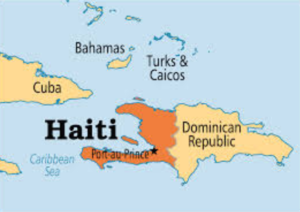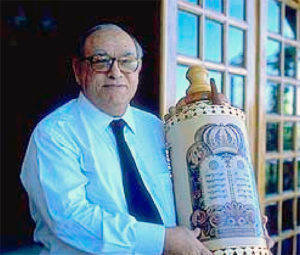 It is believed that the first Jew to arrive in Haiti was Luis de Torres, who was travelling as an interpreter for Christopher Columbus, however the first true community was established by Dutch Jews in the early 1630’s who emigrated from Brazil to work on the sugar plantations. Only 50 years later the Jews were expelled from all French Colonies, including Haiti, when the French passed the Code Noir (Black Code), which forbade the practice of any religion other than Roman Catholic. Some Jews however were able to stay in Haiti under special residence permits.
It is believed that the first Jew to arrive in Haiti was Luis de Torres, who was travelling as an interpreter for Christopher Columbus, however the first true community was established by Dutch Jews in the early 1630’s who emigrated from Brazil to work on the sugar plantations. Only 50 years later the Jews were expelled from all French Colonies, including Haiti, when the French passed the Code Noir (Black Code), which forbade the practice of any religion other than Roman Catholic. Some Jews however were able to stay in Haiti under special residence permits.
The Jewish Marranos (Jews who feigned conversion to Christianity but secretly practiced Judaism) were all murdered or expelled – along with the rest of the white population – during the slave revolt of Toussaint L’Ouverture in 1804. A few years later, many Polish Jews arrived in Haiti due to civil strife in Poland (with the invading Russians, Prussians and Austrians). Recently, archaeologists have uncovered an ancient synagogue of Crypto-Jews in the city of Jérémie, the only one found on the island. Several Jewish tombstones have also been found in port cities such as Cap-Haïtien and Jacmel.
 By the end of the 19th century, Sephardic Jews began arriving from Lebanon, Egypt and Syria. In 1937, Haitian officials began issuing passports to Eastern European Jews fleeing the Nazis. Unfortunately, though, it seems that more Jews were unable to acquire visas to Haiti due to the cost – $5,000. However, about 70 Jewish families (an estimated total of up to 300 lives) lives were saved. Many of those grateful Ashkenazim stayed until the late 1950s. At one time, as many as 300 Jews lived in Haiti.From 1945-1970 there was a steady decrease in the number of Jews until only ten families were left.
By the end of the 19th century, Sephardic Jews began arriving from Lebanon, Egypt and Syria. In 1937, Haitian officials began issuing passports to Eastern European Jews fleeing the Nazis. Unfortunately, though, it seems that more Jews were unable to acquire visas to Haiti due to the cost – $5,000. However, about 70 Jewish families (an estimated total of up to 300 lives) lives were saved. Many of those grateful Ashkenazim stayed until the late 1950s. At one time, as many as 300 Jews lived in Haiti.From 1945-1970 there was a steady decrease in the number of Jews until only ten families were left.
In recent years the number increased again. The Israeli government opened an embassy in Port-au Prince. In addition to the embassy personnel, there are here also three Israeli agricultural experts with their families. These experts serve as technical advisors to the local authorities. Several Jews from the United States have established assembly plants. There are now about 150 Jews in the country, however, there is neither a synagogue nor a Jewish cemetery.